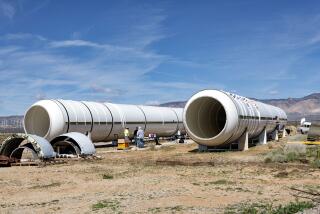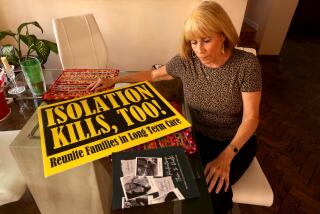U.S. Invites Soviets to Visit ‘Star Wars’ Facilities in Orange County, New Mexico
- Share via
WASHINGTON — The United States, in an effort to defuse Soviet resistance to U.S. missile defense research, has invited a team of Soviet technical experts to visit two American “Star Wars” facilities, a U.S. official said Tuesday.
Beginning Friday, Soviet and American arms negotiators in Geneva are expected to hammer out details of the proposed visit, which would open a TRW Inc. laboratory in San Juan Capistrano and a U.S. Energy Department lab in New Mexico to as many as 10 Soviet specialists.
“We are hopeful that the Soviets will accept this invitation,” said Henry F. Cooper, chief U.S. negotiator at the space defense talks in Geneva. “It was made without conditions, but we hope that it will provide a basis then for discussions in Geneva that will lead them to accept an exchange in the future of such visits.”
Secretary of State James A. Baker III proposed the Soviet visit during a weekend session with Soviet Foreign Minister Eduard A. Shevardnadze, who responded positively, according to U.S. officials.
The U.S. government is eager to gain access to Soviet laboratories engaged in missile defense research and they hope that such visits will flow from Baker’s initiative.
In recent months, the Soviets have opened several of their most sensitive facilities to visiting U.S. lawmakers and arms control proponents. The participants concluded that the Pentagon has overplayed the threat posed by the Soviet equivalent of America’s Strategic Defense Initiative anti-missile program, also known as “Star Wars.”
“I’m sure the intelligence community has learned things they have not known before because they got closer” to Soviet facilities, Cooper said. But he contested claims that the Soviet “Star Wars” effort has been less potent than advertised.
“They are still working quite deliberately in this area,” Cooper said.
Laser Viewing Suggested
Baker proposed allowing Soviet visitors to view the Alpha laser project at TRW’s Orange County research facility. Cooper said that the Soviets “have explicitly complained in the past” about work under way at the TRW facility and at Los Alamos Laboratory, the other site proposed for the Soviet visit.
The Alpha chemical laser would be a component of the SDI’s “Zenith Star” program. Zenith Star is an effort to develop a satellite-based laser that would pick off missiles in the middle of their trajectories. It is now undergoing ground-based tests within the sprawling TRW facility.
At Los Alamos, Soviet visitors would be permitted to see a neutral particle-beam laser placed aboard a rocket in “Star Wars” experiments. The research laser has been tested extensively, provoking Soviet protests.
Cooper said the Soviet visitors would be able to learn more from a visit to the two labs than they could glean from their overhead satellites. But John Pike, an analyst for the Washington-based Federation of American Scientists, said that the Soviets likely would learn little more than they can read in the transcripts of congressional hearings and defense trade magazines.
“Most of the sort of stuff you can find out from wandering around and kicking the tires in facilities like these is stuff you can find in the open literature,” Pike said. “The process is probably more important than the content.”
Reflecting the broad appeal of Baker’s proposal among American arms control experts, Pike said: “There’s basically no downside to this. There’s something in it for everybody.”
Private firms that do business with the Pentagon, however, have rarely welcomed visits by Soviet experts. During negotiations that led to the 1987 Intermediate Nuclear Forces Treaty, firms that were potentially subject to short-notice Soviet inspections expressed fears that security could be jeopardized.
TRW spokesman Julian Levine, however, declined to discuss the effects of the proposed Soviet visit on the firm’s defense-related business.
“It’s a government-to-government issue,” said Levine, vice president of communications for TRW’s Space and Defense Sector. “We have been advised of it, and would be pleased to cooperate” when notified of the outcome of forthcoming talks in Geneva, he said.
More to Read
Sign up for Essential California
The most important California stories and recommendations in your inbox every morning.
You may occasionally receive promotional content from the Los Angeles Times.











